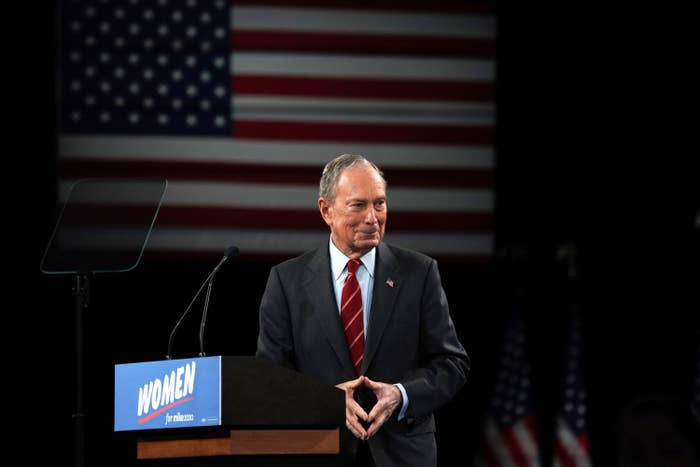Michael Bloomberg Is Campaigning To Win Back Trump’s Jewish Supporters

The former mayor is launching a
coalition targeting Jewish voters and building a platform in keeping with
traditional Democratic rhetoric on Israel.
Michael
Bloomberg is launching a pitch to moderate Jewish voters aimed also at wooing
away those who have supported Donald Trump.
Speaking
at a Jewish center in Miami on Sunday, Bloomberg said he was committed to
battling growing anti-Semitism, reiterated strong support for Israel, and said
that while he opposed the Obama administration’s Iran nuclear deal he would
seek to revive it.
The
former New York mayor began with a thinly veiled reference to Bernie Sanders:
“I know I’m not the only Jewish candidate running for president. But I am the
only one who doesn’t want to turn America into a kibbutz.” Sanders, who briefly
lived on a kibbutz in Israel, has broad appeal among a rising tide
of progressive Jews, in part because he has been critical of the
government of Israeli Prime Minister Benjamin Netanyahu and denounced the
occupation, going so far as to say he could make US aid to the
country conditional on improving conditions in Gaza and elsewhere.
Bloomberg’s
pitch is far more in keeping with traditional Democratic rhetoric, and though
he repeatedly criticized Trump and his approach on Sunday he also backed some of
the president’s policies that have won him support among more conservative
Jewish voters.
After
making a couple of Jewish jokes (referencing both the Torah and pickles),
Bloomberg said at the event, which launched “United for Mike,” a new coalition
targeting Jewish Americans, that he “will always have Israel’s back. I will
never impose conditions on our military aid, including missile defense — no
matter who is prime minister.” He then reminded the crowd he was against the
Iran deal originally, saying it was not strong enough, before criticizing
Trump’s decision to unilaterally withdraw from it. An aide to Bloomberg told
BuzzFeed News: “Mike supports rejoining the nuclear deal, and then aggressively
negotiating to improve it.”
Bloomberg
also singled out Trump’s controversial decision to move the US embassy to
Jerusalem. “There are those who will cite the embassy move to as a reason to
support the president,” Bloomberg said. “And to that I say very clearly: If I
am elected, you will never have to choose between supporting Israel and
supporting our values here at home.” An aide told BuzzFeed News that “Mike
believes that moving the US embassy there was the right thing to do, but it was
a mistake to do so unilaterally and outside the context of the broader Israeli–Palestinian
dialogue.”
Bloomberg
linked an increase in anti-Semitic attacks, and hate crimes more broadly, with
Trump’s presidency. “Anti-Semitism is hardly the exclusive domain of one
political party. It can be found on both the right and the left — on town
squares and campus quads,” he said. “When the president calls his supporters
‘real Americans’ — an echo of the language that nativists, anti-Semites, and
the KKK used for many decades — he undermines our fundamental national values.
When he is silent — and even supportive, through his words and tweets — as
racist groups spread hate, he puts the public safety of our communities at
risk.”
There is
just no escaping the direct line between his conduct in office and the rise of
violent attacks targeted at minority groups across the country,” he said.
Many of
the moves Trump has undertaken, including in Israel, have been designed to
appeal to his evangelical base, and while he has denounced anti-Semitism he has
also repeatedly trafficked in anti-Semitic tropes. Managing to both disparage
Democrats and trade on anti-Semitic tropes of Jewish loyalty,
he said last year: “In my opinion, if you vote for a Democrat, you're
being very disloyal to Jewish people and you're being very disloyal to Israel.”
According
to Gallup, around 65% of Jewish Americans identify as or lean toward
Democrats, while 30% identify with or lean toward the Republican Party. Trump’s
approval rating is lower among Jews than among Americans at large, according to
Gallup, which found only 29% approved in the first half of last year, compared
to 42% more broadly. Bloomberg, who entered the race late and is skipping the
early states including Iowa and New Hampshire, could be seeking to capitalize
on that.
Asked if
the Bloomberg campaign was targeting Trump voters in particular, the aide said:
“The campaign would welcome the support of all Jewish voters — regardless of
who they voted for in the past.”
Rep. Max
Rose of Staten Island, who earlier this month became the first member of
Congress to endorse Bloomberg, gave the former mayor credit for rebuilding
New York after Sept. 11 (a mantle often worn by Trump’s lawyer Rudy Giuliani)
and said, “America now finds itself at a similar fork in the road.”
“This is
a scary moment,” Rose said. “I’ve got Jews in my community who are afraid to go
outside with their kippah on, afraid to speak Hebrew in public, afraid to
congregate together. And Mike Bloomberg is the type of leader who is well
versed in these issues and able to rise above the partisan fray so that we are
not attributing it to one side of the political spectrum or the other, we’re
not using Israel as a political football.”
He
praised what he saw as Bloomberg’s “political courage” and appeal to various
audiences. “It doesn’t seem like people often want to speak about this but if
you want to get a piece of legislation signed in 2021 by the president of the
United States, you’re going to have to get conservative Democrats and
Republicans on board. Plain and simple, and that’s going to require leadership.”
Leave a Comment